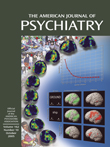Amygdala Response in Patients With Acute PTSD to Masked and Unmasked Emotional Facial Expressions
Abstract
OBJECTIVE: This study used functional magnetic resonance imaging to investigate amygdala response in patients with acute posttraumatic stress disorder (PTSD) to emotional expressions. METHOD: Thirteen medication-free individuals with acute PTSD and no axis I psychiatric comorbidity were scanned while viewing pictures of fearful or happy faces, presented above or below consciousness, with backward masking. RESULTS: There was a significant positive correlation between the severity of PTSD and the difference in amygdala responses between masked fearful and happy faces and a corresponding negative correlation for the difference between unmasked fearful and happy faces. CONCLUSIONS: These findings suggest that functional abnormalities in brain responses to emotional stimuli observed in chronic PTSD are already apparent in its acute phase.



